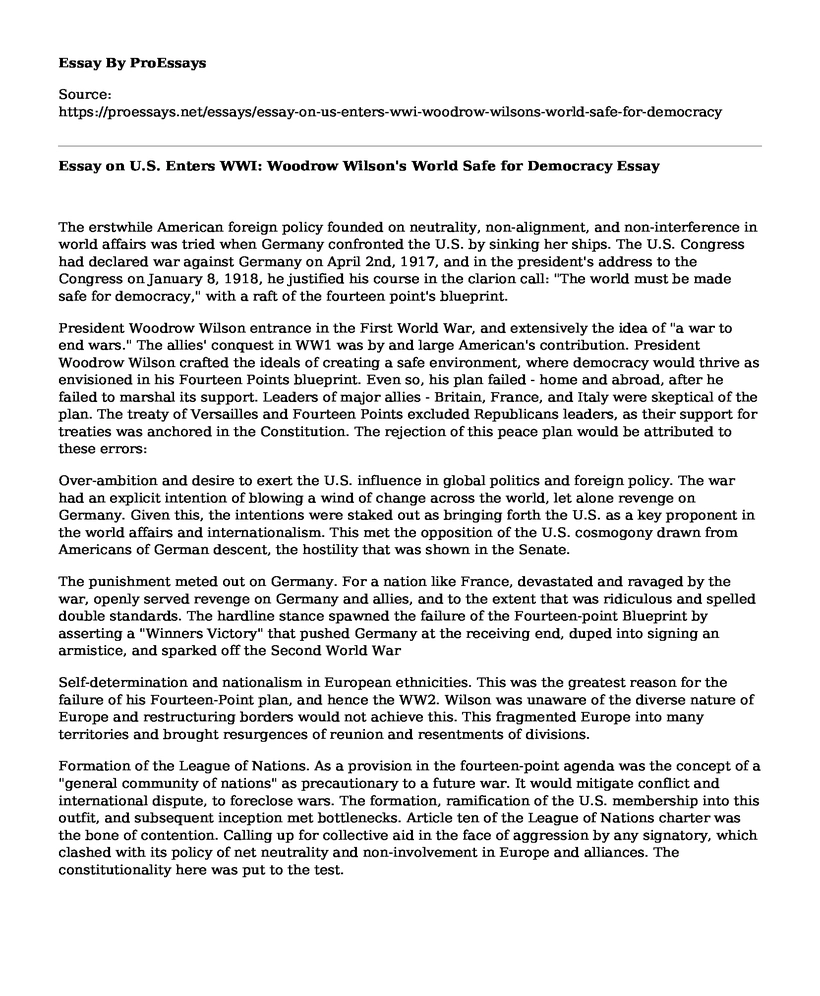The erstwhile American foreign policy founded on neutrality, non-alignment, and non-interference in world affairs was tried when Germany confronted the U.S. by sinking her ships. The U.S. Congress had declared war against Germany on April 2nd, 1917, and in the president's address to the Congress on January 8, 1918, he justified his course in the clarion call: "The world must be made safe for democracy," with a raft of the fourteen point's blueprint.
President Woodrow Wilson entrance in the First World War, and extensively the idea of "a war to end wars." The allies' conquest in WW1 was by and large American's contribution. President Woodrow Wilson crafted the ideals of creating a safe environment, where democracy would thrive as envisioned in his Fourteen Points blueprint. Even so, his plan failed - home and abroad, after he failed to marshal its support. Leaders of major allies - Britain, France, and Italy were skeptical of the plan. The treaty of Versailles and Fourteen Points excluded Republicans leaders, as their support for treaties was anchored in the Constitution. The rejection of this peace plan would be attributed to these errors:
Over-ambition and desire to exert the U.S. influence in global politics and foreign policy. The war had an explicit intention of blowing a wind of change across the world, let alone revenge on Germany. Given this, the intentions were staked out as bringing forth the U.S. as a key proponent in the world affairs and internationalism. This met the opposition of the U.S. cosmogony drawn from Americans of German descent, the hostility that was shown in the Senate.
The punishment meted out on Germany. For a nation like France, devastated and ravaged by the war, openly served revenge on Germany and allies, and to the extent that was ridiculous and spelled double standards. The hardline stance spawned the failure of the Fourteen-point Blueprint by asserting a "Winners Victory" that pushed Germany at the receiving end, duped into signing an armistice, and sparked off the Second World War
Self-determination and nationalism in European ethnicities. This was the greatest reason for the failure of his Fourteen-Point plan, and hence the WW2. Wilson was unaware of the diverse nature of Europe and restructuring borders would not achieve this. This fragmented Europe into many territories and brought resurgences of reunion and resentments of divisions.
Formation of the League of Nations. As a provision in the fourteen-point agenda was the concept of a "general community of nations" as precautionary to a future war. It would mitigate conflict and international dispute, to foreclose wars. The formation, ramification of the U.S. membership into this outfit, and subsequent inception met bottlenecks. Article ten of the League of Nations charter was the bone of contention. Calling up for collective aid in the face of aggression by any signatory, which clashed with its policy of net neutrality and non-involvement in Europe and alliances. The constitutionality here was put to the test.
Conclusion
Wilson, hellbent on this article and radically pro-Treaty of Versailles that would occasion the creation of League of Nations, would not take a "No!" for an answer. His advocacy for the creation of League of Nations amidst deliberations and negotiations with European powers was nullified by the Senate's failure to approve the United States' membership to the League. This ushered in a hailstorm of failures for Wilson's office tenure and failure of his plan. Versailles Treaty and League of Nations turned out to be a lost cause as it would water down U.S. sovereignty displace it with a global governing institution.
Cite this page
Essay on U.S. Enters WWI: Woodrow Wilson's World Safe for Democracy. (2022, Dec 29). Retrieved from https://proessays.net/essays/essay-on-us-enters-wwi-woodrow-wilsons-world-safe-for-democracy
If you are the original author of this essay and no longer wish to have it published on the ProEssays website, please click below to request its removal:
- Expansion Beginning 1500 of Asian Empires
- John Adams and Thomas Jefferson Essay
- Geostrategic Problems in China, Africa, and Russian Essay
- Essay Example on Modern Policing: Adapting to New Technology & Community Objectives
- Essay Example on Houston Roughnecks: Rising Pro Football Team in TX from XFL
- Essay Example on Presidential Powers: Examining the Limits of Executive Authority
- Essay Example on COVID-19 Ravages Canada: 38,500 Cases Confirmed and Counting







